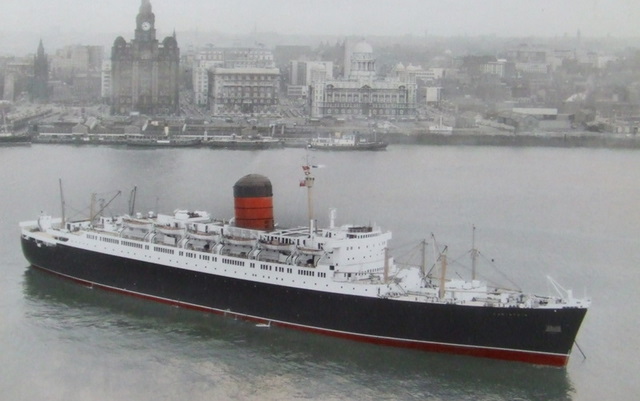Docking a ship requires a tremendous amount of skill, ability and resolve. This is especially the case when the weather is bleak and uncooperative. Then there’s docking an ocean liner. While cruise ships today are highly maneuverable and largely don’t need tugboats, liners in the 1960s were downright clunky and relied on them to dock. But master seamanship is typically what wins the day.
Sometimes, though, there might just be another thing at work.
Dangerous Fog
Fog is the bane of any ship captain and has traditionally been extremely dangerous in busy shipping lanes around the world. Collisions were tragically common, especially in the early days before radar. Sometimes these were comparatively minor accidents, such as when a schooner named Alida struck the SS Noordam off the Isle of Wight. Alida’s bowsprit was broken off, but both ships were otherwise fine and carried on with their respective voyages.
But foggy collisions could also have tragic consequences. In 1914, the Swedish collier Storstad accidentally rammed and sank the RMS Empress of Ireland on the St. Lawrence River. The Canadian Pacific liner sank in just 14 minutes and took 1,012 souls to the bottom with her. Over four decades later in 1956, even with the advent of radar, the Swedish American liner Stockholm accidentally struck the Italian liner Andrea Doria. Although 46 people died in the disaster, 1,663 people were rescued from the sinking Doria in perhaps the greatest maritime rescue operation of all time.
Given the danger surrounding fog at sea, it’s no surprise that Captain (later Commodore) Harry Grattidge reacted the way he did when his ship, HMT Georgic, encountered HMS Dido off the Welsh Coast in 1945. The light cruiser wasn’t sounding her foghorn, so the irritated Captain Grattidge became a royal pain for them in return.
A Sixth Sense
Port cities aren’t immune to fog either. The future Captain Bob Arnott of Queen Elizabeth 2 was aboard RMS Carinthia in 1960 when the ship encountered heavy fog in Liverpool. Captain (later Commodore) Geoffrey Marr was in command at the time.
In his memoirs, Captain Arnott wrote:
[Captain Marr] was a great talker, words tumbling from his lips at an amazing rate, and his gift for rhetoric was superbly demonstrated in his lecture presentation on the sinking of the Bismarck. Geoffrey had served in the Royal Navy Reserve on one of the ships that sent the German battleship to the bottom on 27 May 1941, so his graphic descriptions were wholly authentic.
Yet I remember him not so much for his oratory as for a remarkable piece of navigation that brought Carinthia safely to the Pier Head in Liverpool when the Mersey was cloaked completely in blinding black fog. We were anchored in the river waiting for the solid blanket to lift; even the ferry boats across the Mersey were unable to move. Suddenly Geoffrey’s fine voice called: ‘We’re going in.’ He talked our tugs to us over the VHF radio and, with visibility down to zero, took the huge 22,000-ton liner cleanly into the landing stage. Passengers, already resigned to another night at sea, cheered in relief and delight, and the crew, anxious to get home to loved ones, were equally elated. It was a magnificent achievement by the Captain, considering the quite elementary navigational aids of 1960 in comparison to today’s sophistication.

Captain Arnott then goes on to explain how he believes Captain Marr accomplished this impressive feat of seamanship:
It’s a matter of record that some Captains have a sixth sense in fog; they can ‘see’ things quite invisible to the eyes of ordinary humans, and have often made apparently inexplicable decisions which, within seconds, have saved ships and lives.
Perhaps out of modesty, many captains do not wish to talk about this sixth sense. Maybe it’s because they can’t explain it themselves. “In any case,” Arnott concluded, “Captains generally won’t discuss the matter, and that includes the normally prolific talker, Commodore Geoffrey Marr.”

Leave a Reply